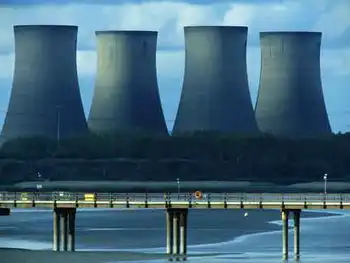Pickering woes fuel debate
PICKERING, ONTARIO - It has not been a good summer for that distinctively Canadian invention, the CANDU nuclear reactor.
At the Pickering nuclear plant, two CANDU reactors that had recently been refurbished – at a cost of more than $2 billion – have been down for maintenance all summer. And just recently a third Pickering reactor was taken offline for repairs.
With two others permanently mothballed because the cost of refurbishing them was considered prohibitive, that means just three of the eight CANDU reactors at Pickering are now churning out megawatts for Ontario's power-hungry households and industries.
This sorry performance comes at a time when the operator of the Pickering plant – government-owned Ontario Power Generation – is pondering whether to invest billions in the refurbishing of four more Pickering reactors to extend their life spans. And it also occurs when the provincial government is trying to decide what technology to buy for the next generation of nuclear plants to replace the existing ones. The choice is between: CANDU, the heavy-water reactor, described as "the crown jewel" of Canadian technology by its owner, the federal government's Atomic Energy of Canada Ltd. (AECL).
A light-water model produced by three competing French, American and Japanese/American firms.
Underscoring this choice is a nondescript office building just two kilometres down Brock Rd. from the Pickering nuclear plant, where Areva Canada is headquartered. Areva is a giant nuclear firm owned by the French government.
Armand Laferrère, the amiable Frenchman who heads up Areva Canada, says he takes no pleasure from CANDU's recent problems at Pickering. But then he quickly adds: "I would take the opportunity to emphasize that the product we deliver does not need any mid-life refurbishment and does not need any outages longer than 32 days."
Moreover, continues Laferrère, light-water reactors have a 60-year life span, about twice the apparent limit for CANDU. "That's the reason most of the markets right now are going to light water," he says. "I don't see heavy water gaining market share in the future compared to what it has now."
Indeed, while the nuclear industry is undergoing a revival around the world as governments opt for energy solutions that are free of greenhouse gas emissions, AECL and CANDU do not appear to be sharing in the bounty. The last sale of a CANDU reactor was to China more than a decade ago.
Still, AECL is a major domestic employer, with 4,000 direct employees, including 1,100 engineers, and 850 other technical professionals. Overall, an estimated 30,000 jobs at 150 companies are dependent on CANDU reactors.
Mindful of this, Laferrère counters that Areva would mostly call on the same people to build and operate its light-water reactors. "There is no way that we would be a threat to employment," he says.
Furthermore, Areva is talking to the federal government about forming a partnership with AECL. (Ottawa is also in discussions with Areva's American competitor, General Electric.)
If Areva partnered with AECL, says Laferrère, "It would mean that the Canadian industry, which is an excellent one and in Ontario, especially, a rather large one, would get a foothold into the technology that sells best in the world, which is the light water, while retaining its specialized skills in heavy water."
Every new problem at Pickering adds fuel to this argument.
Related News

Clean, affordable electricity should be an issue in the Ontario election
TORONTO - Ontario electricity demand is forecast to soon outstrip supply, a problem that needs attention in the upcoming provincial election.
Forecasters say Ontario will need to double its power supply by 2050 as industries ramp up demand for low-emission power and consumers switch to electric vehicles and space heating. But while the Ford government has made a flurry of recent energy announcements, including a hydrogen project at Niagara Falls and an interprovincial agreement on small nuclear reactors, it has not laid out how it intends to bulk up the province’s power supply.
“Ontario is entering a period of widening electricity shortfalls,”…




